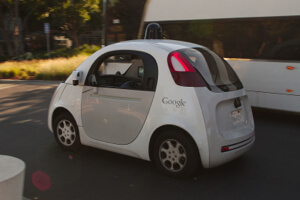An important component of being optimistic about the future is maintaining a healthy dose of skepticism. It’s a delicate balance we’re always exploring at Singularity Hub while covering emerging technology and its future implications.
But with a foot grounded in the present, we’d be foolish to close our minds to venturing into the future. That’s one reason science fiction is a recurring theme in our content—it allows us to step into a new future and give a different reality a test.
Foresight goggles have yet to be invented, but we put on an imaginary pair to look to 2016 and beyond at the technologies we’re most anticipating coming to life.
 Self-driving cars
Self-driving cars
“Living in Silicon Valley, I see self-driving cars with such frequency that, shortly after I moved here, I grew tired of playing an ‘over/under’ game on daily walks. (That is, ‘Will I see more or less than, say, five self-driving cars on this walk?’) The more I hear about their disruptive potential, the less time I spend thinking about public transportation at all. Even high-speed rail systems already seem costly and cumbersome compared to the ability to summon an electric self-driving car on my phone and just be on my way.”
–Matthew Straub, the voice behind Singularity Hub’s social media
Recommended reading: Singularity Hub, Are Google’s 11 Driverless Car Accidents Scary—or Really Impressive?
 Smart contracts
Smart contracts
“It’s the idea that any contractual agreement—such as jobs, loans, insurance, and even marriage—could potentially be securely stored and automatically verified by the same technology (blockchain) that makes bitcoin work. This could eliminate the slew of people, businesses, and institutions positioned as financial and legal middlemen, along with their associated red tape. It’s hard to even imagine what the world would look like if smart contracts were broadly implemented.”
–David Hill, Editor-in-Chief, Singularity Hub
Recommended reading: Fast Company, What Are Smart Contracts? Cyptocurrency’s Killer App
 Light field cameras for virtual reality
Light field cameras for virtual reality
“Last month Lytro announced their new camera Immerge, which they claim is ‘the world’s first professional light field solution for cinematic VR.’ The camera captures light field data simultaneously from all directions and when used for VR, viewers can move around in captured ‘real world’ space, as opposed to recreated computer-generated environments. This is a game changer for the industry and the new technology is also tackling VR simulator sickness. Light field technology is front and center for AR companies as well, such as Magic Leap.”
–Sveta McShane, Production Manager, Singularity Hub
Recommended reading: PetaPixel, Lytro Immerge is the World’s First Light Field Camera for Virtual Reality
 OpenAI
OpenAI
“Creating human-level AI has the potential to transform our lives for the better. Yet, if put in the wrong hands, sophisticated AI may also has the power to inflict serious harm on society. To counter this, OpenAI, a new billion-dollar nonprofit was recently announced with the singular mission to create AI that benefits humanity. Though the co-chairs—Elon Musk and Sam Altman (president of Y Combinator)—have already endured scrutiny for such a lofty mission, I have to ask, what better way to ensure benevolent AI is developed than to invest in its creation?”
–Alison E. Berman, Singularity Hub Staff Writer
Recommended reading: MIT Technology Review, What Will It Take to Build a Virtuous AI?; Singularity Hub, Inside OpenAI: Will Transparency Protect Us From Artificial Intelligence Run Amok?
Image Credit: Shutterstock



